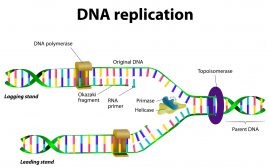Definition
noun
(genetics) A type of mutation wherein the change in gene leads to the partial loss of the normal (wild-type) gene function, such as by reduced expression (of protein or RNA)
Supplement
Mutations involving recessive genes often results in the reduction or elimination of the gene function. When the function of the gene is completely eliminated the mutation is referred to as amorphic. But when the mutation leads to only a reduction in the gene function it is called hypomorphic. Thus, in the latter type of mutation, the function of the gene is not eliminated but reduced. Other types of mutations based on the effects on the phenotypes are antimorphic mutation, hypermorphic mutation, and neomorphic mutation. Both amorphic and hypomorphic mutations are associated with the loss of function due to a gene mutation. The other three, in contrast, are related to the “gain of function” of the gene. The terms were coined by the American geneticist, Hermann J. Muller.1
Synonym(s):
- partial loss-of-function mutation
- weak mutation
- hypomorph
Compare:
See also:
Reference(s):
1Muller, H. J. 1932. Further studies on the nature and causes of gene mutations. Proceedings of the 6th International Congress of Genetics, pp. 213–255.







